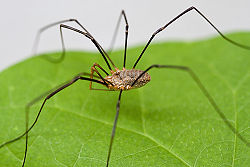READY TO GET STARTED?
REQUEST A FREE ESTIMATE
Fill out the form below or call (888) 466-7849 for a free, no-obligation estimate.
If you are just now being able to absorb the menace of the Gallinipper mosquito, unfortunately you won’t be able to breathe easy just yet. Evidently, tourists aren’t the only people coming to our American shores this summer. The Asian tiger mosquito is named for the black-and-white stripes on its body. You may think that spraying on some bug spray during the day time will help keep them at bay, but think again! This mosquito is different from others in that it bites all day long and pursues not only humans, but also dogs, cats, birds and other animals.
According to Livescience.com, entomology professor Dina Fonseca reports “Part of the reason it is called ‘tiger’ is also because it is very aggressive… you can try and swat it all you want, but once it’s on you, it doesn’t let go.” Another serious concern of this particular insect is that it spreads more than 20 diseases, including West Nile fever, dengue fever, yellow fever and two types of encephalitis.
Since the 1980s, the Asian tiger mosquito has reached 26 states, primarily in the eastern United States. Warm weather helps this pest get around, but its eggs are also capable of surviving cold weather. To help eliminate the potential destruction of this pest, it is important to remove standing water, wear insect repellent and wear long sleeves and pants outdoors. Naturally, Northwest Exterminating is equipped with preventive solutions to give you a mosquito-free summer. If you’re interested in our services, give us a call!
Sources:
http://www.livescience.com/37715-asian-tiger-mosquitoes-chikungunya.html
Daddy Long legs or Daddy Long legs Spider?
 Daddy Long legs, or harvestmen, are not actually spiders. Daddy long legs are not poisonous, have long legs and a large bulbous-looking body. They feed on insects, which makes them helpful around the garden. They are especially active at the time of harvest, toward the end of summer and beginning of fall. To keep daddy long legs away, vacuum carpet, upholstery, and curtains frequently to remove spider webs, adult spiders, and egg sacs. Be sure to dispose of the vacuum bag. Tightly seal the trash bag to make sure eggs can’t hatch and crawl out of the bag.
Daddy Long legs, or harvestmen, are not actually spiders. Daddy long legs are not poisonous, have long legs and a large bulbous-looking body. They feed on insects, which makes them helpful around the garden. They are especially active at the time of harvest, toward the end of summer and beginning of fall. To keep daddy long legs away, vacuum carpet, upholstery, and curtains frequently to remove spider webs, adult spiders, and egg sacs. Be sure to dispose of the vacuum bag. Tightly seal the trash bag to make sure eggs can’t hatch and crawl out of the bag.
Tip for preventing daddy long legs: Pour 1 cup white vinegar and 1/3 cup vanilla extract into a spray bottle and shake. Spray areas where the daddy long legs have been spotted indoors and out. The smell will repel the insects.
Daddy Long legs Spiders, or cellar spiders, although venomous, are not known to be harmful to humans. Their fangs are short and they do not have enough muscle to be able to penetrate human skin. Daddy long legs spiders are very fragile and delicate. They are usually brown or gray in color, cylindrical in shape and their legs are very long and thin. Daddy long legs spiders survive on others species of spiders, or on occasion they will invade other spiders’ webs and consume the host, their egg, and any prey caught in the web. They hang upside down on their webs, which they create in dark, damp places like home cellars, caves or abandoned animal burrows.
Tip for preventing daddy long leg spiders: To keep daddy long legs spiders away you will need caulk, a vacuum cleaner, a duster, boric acid/Borax, and spider traps. Caulk cracks in your walls, foundation, and loose window frames. With a vacuum cleaner attachment, suck up spiders and their webs at wall corners, undersides of furniture, floors beneath appliances, crevices along the baseboards and around windows and curtains. Insects attract daddy long legs spiders so dust frequently and repair leaking pipes and faucets both inside and out. Sprinkle boric acid under doorways, around window sills, along baseboards, and under appliances. Boric acid is a common ingredient in household cleaning products and is not harmful to humans and pets. Place spider traps in areas where spiders are usually seen.
Barry Teubert
Northwest Exterminating
Savannah Service Center
[email protected]
As a pest control company, Northwest Exterminating makes it a point to provide cleaner living and working environments. Furthermore, we do so by following federal and state guidelines, including the Endangered Species Act of 1973. The Endangered Species Act of 1973 provides legal protection for endangered and threatened species, requiring all federal agencies to ensure their actions do not harm the lives of the endangered. This is important to pest control because the Environmental Protection Agency (EPA) can restrict the use of pesticides that may be threatening. Northwest Exterminating provides itself on not only meeting these standards, but also exceeding them by providing green pest control as an alternative to traditional pest control.
According to the U.S. Fish and Wildlife Service, “Pesticides are useful to society because they are used to control…potential disease-causing organisms, insects, weeds and other pests.” The EPA takes careful measures to ensure that the products used to control pests do not have unreasonable effects on humans or the environment. For instance, this agency regulates the sale and use of ALL pesticides used in the United States. Just as recently as 2008, the EPA began the Pesticide Registration Review Programs to update research on how pesticides may affect endangered species.
Sources:
http://www.fws.gov/contaminants/Issues/Pesticides.cfm
Georgia Pest Control Employee Registration Manual